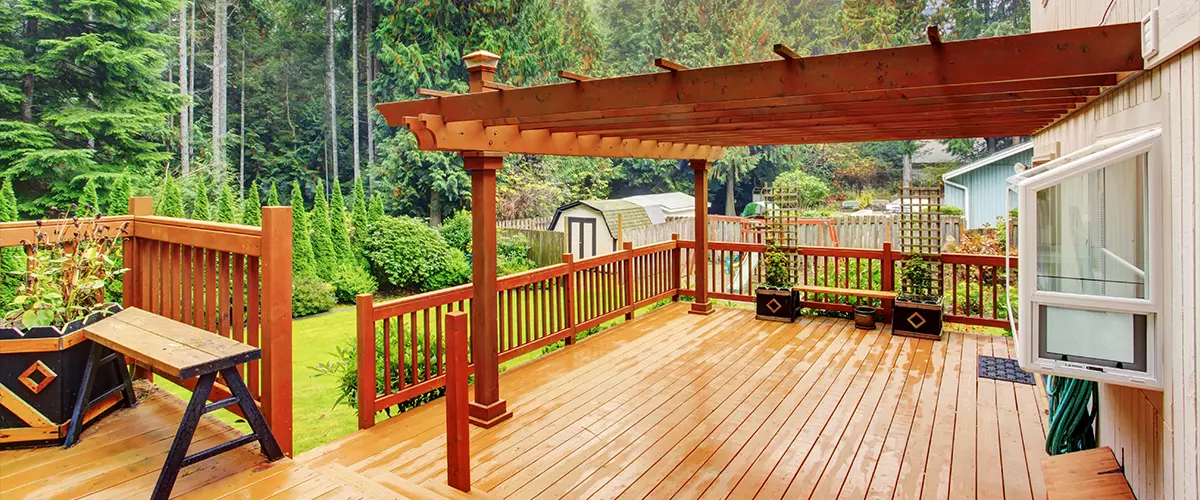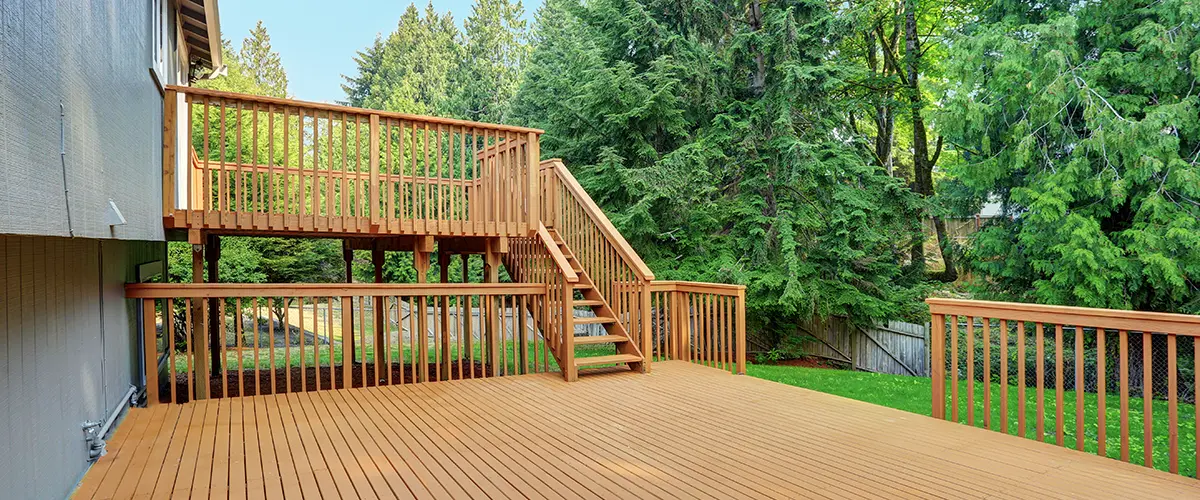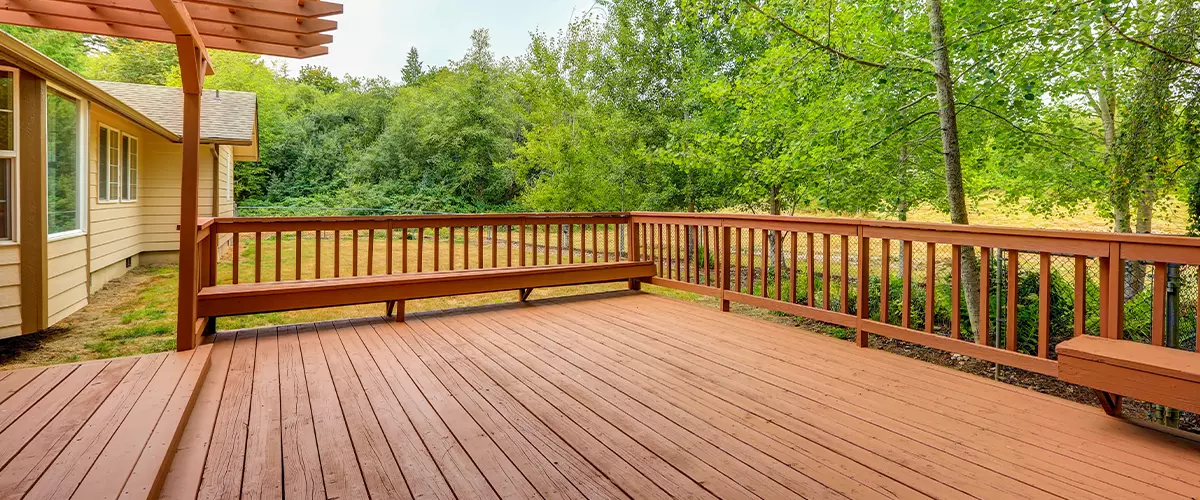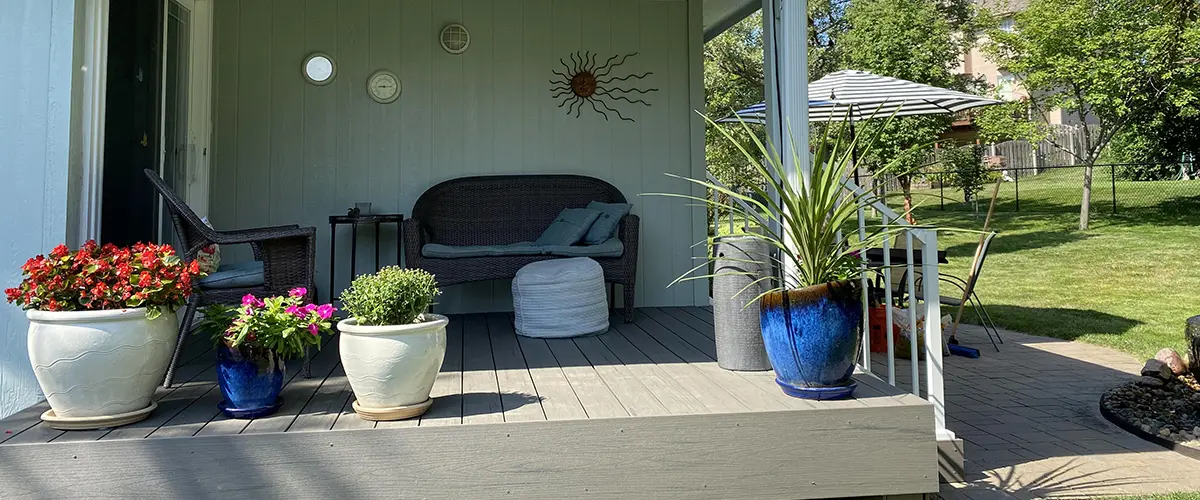Choosing between an elevated deck or a ground-level deck can be tricky for Omaha homeowners, as there are pros and cons to both.
Generally, elevated decks are preferred by most homeowners, but they cost most and take more time to build. What makes them our top choice is the fact that an elevated deck allows you to enjoy a more beautiful landscape.
In this post, we’ll weigh the pros and cons of elevated and ground-level decks. Let’s begin!

Elevated Decks vs Ground-Level Decks: Pros and Cons
Appearance
Raised decks offer a grand view of your Omaha yard, lending a sense of openness and sophistication. They can easily become the focal point of your outdoor space with their raised platform and potential for under-deck designs like additional storage or covered patios.
The structure’s height often allows for unobstructed sights, making it ideal if you love to gaze at the sunset or keep an eye on kids playing in the backyard.
Ground-level decks seamlessly extend from home to nature, blending almost effortlessly with your garden or lawn. Their low profile maintains landscape continuity and invites casual gatherings, encouraging guests to step freely onto surrounding grassy areas.
Different deck ideas will complement different homes, so it’s important to choose a deck design that not only matches your property but also improves it.
Cost
Shifting from the visual appeal to finances, the price tag of your new deck plays a crucial role in decision-making. Ground-level decks typically cost less because they don’t require as many structural supports like beams and joists, which are mandatory for an elevated deck.
This makes a ground-level or freestanding deck an attractive option for homeowners on a budget.
Elevated decks come with higher costs due to their complexity. They often demand extensive framing, additional posts, stairs, and railings that all add up quickly. Plus, there might be extra expenses related to ensuring these structures can withstand elements like wind or potential earthquakes.
Upkeep
Elevated decks typically require more maintenance due to their structure and exposure to the elements.
You’ll need to regularly check supports, railings, and stairs for safety and apply sealants or stains to protect against weather damage.
In contrast, ground-level decks often demand less frequent upkeep since they are shielded somewhat by surrounding landscapes. However, being close to the ground can attract pests like termites or lead to moisture-related issues such as rotting wood.
Durability
Elevated decks bring with them the advantage of reduced contact with moisture and pests from the ground, which often leads to a longer lifespan.
The elevation also allows air to circulate freely around all parts of the structure, preventing dampness that can cause rot or mold in wood and rust in metal supports.
Ground-level decks may require more frequent checks for signs of decay as they are directly exposed to soil and water accumulation, especially after rain or snow.
Installation
Installing an elevated deck generally requires more labor and materials than a ground-level deck. The complexity increases because you must consider safety features like railings and structural support to prevent collapse.
It often involves accessing higher points of your house, using ladders or scaffolding, and potentially disrupting siding or exterior finishes. This type of installation calls for precise planning and can be affected by the terrain of your Omaha home’s yard.
On the other hand, ground-level decks are simpler in design and execution. They typically need less material since the deck frame doesn’t require posts or stairs.
Environmental Impact
Elevated decks typically require more materials and a deeper foundation, which could disrupt local ecosystems during construction. Trees might need to be cut down, and heavy machinery can compact soil, affecting water drainage patterns.
In contrast, ground-level decks are often less intrusive as they hug the existing landscape with minimal need for excavation or deforestation.
Resale Value
Elevated decks often offer a higher resale value compared to ground-level decks.
This is because elevated structures can provide captivating views and an added sense of luxury that potential buyers find appealing. They can transform a simple backyard into an inviting outdoor retreat, which is a strong selling point.
Ground-level decks are more subtle additions; while they extend living spaces, they might not have the same ‘wow’ factor or contribute as noticeably to the property’s overall value.
However, for homes where large-scale features aren’t practical or desirable, a ground-level deck could still be a smart investment that enhances outdoor enjoyment without overextending budgets.

Choosing the Right Deck for Your Home in Omaha
Factors to Consider
Choosing the right deck for your Omaha home requires careful thought about your lifestyle and home’s layout. Consider these key factors before making a decision.
- Yard Slope: Look at the slope of your yard. A steep incline might be more suited for an elevated deck, whereas a flat yard could easily accommodate a ground-level deck.
- Sun Exposure: Think about the sun’s path over your property. A raised deck can offer unobstructed exposure if you enjoy basking in the sunlight. Ground-level decks might be cooler and more comfortable during hot summer days, but it all depends on the deck floor.
- Privacy Needs: Evaluate how much privacy you desire. Elevated decks can provide a better view but may expose you to neighbors’ eyes. Ground-level decks often feel more secluded and private.
- Accessibility: Consider who will use the deck. A ground-level deck has no stairs, which is ideal for homes with small children or members with mobility issues.
- Entertainment Style: Tailor your choice to your entertainment style. Do you love hosting large gatherings? An expansive ground-level deck allows guests to move freely between indoor and outdoor spaces. Do you prefer intimate settings? An elevated deck creates a distinct area separate from your yard.
- Future Plans: Consider any future landscaping or home extension plans that could influence the type of deck you choose.
- Budget Constraints: Be honest about how much money you can spend. Elevated decks typically cost more due to additional materials and complex structures needed for support.
- Maintenance Willingness: Reflect on how much time you’re willing to dedicate to upkeep. Generally, ground-level decks may accumulate moisture and require more care than their elevated counterparts.
Recommended options
As you consider adding a deck to your Omaha home, several options stand out for their benefits and suitability. Evaluate each choice carefully to align with your needs and preferences.
- Factor in the scale of your yard when leaning towards a ground-level deck; these decks blend seamlessly into smaller spaces and maintain a natural flow.
- Consider an elevated deck if you cherish views and want an unobstructed vantage point from your home; they provide a better perspective of your surroundings.
- Look at multi-level decks as a dynamic option if your property is sloped; this style allows for creative design and efficient use of space.
- Prioritize materials that demand less maintenance, like composite decking, which can offer longevity and ease regardless of whether you choose an elevated or ground-level deck.
- Assess the accessibility requirements of your household; ground – level decks are often more accessible for those with mobility challenges.

Deck Building Codes For Omaha Homeowners
Local building codes and regulations are crucial for safety and legal compliance of a deck building project. Before you break ground, obtaining the proper permits from the city is essential.
The Omaha Building and Safety Departments set specific requirements regarding the size, height, construction materials, railings, staircases, and spacing between balusters.
Deck builders must also consider zoning laws that dictate how close your deck can be to property lines. Structural integrity is a top priority; therefore, inspections at various stages of construction might be necessary.
If you want to find out more about deck building codes in Omaha, we have an entire post that addresses that. If you’re not interested in it, it’s fine – here at Deck Bros, we’ll get the building permits for you, so you don’t have to deal with all that paperwork.

Conclusion
So, elevated deck or ground-level?
From our experience, many of our clients want an elevated deck because it looks so much nicer. At the same time, many get a two-level deck, which is also a great option for those who can afford it.
Whichever you want, you’ll need an expert to build it for you. We’ve seen so many DIY decks collapse that we keep trying to convince people that saving money is not as important as your safety and well-being.
If you’re interested in a quote from the best deck builder here in Omaha, request a quote by filling out this form or call us directly at (402) 369-5724.
